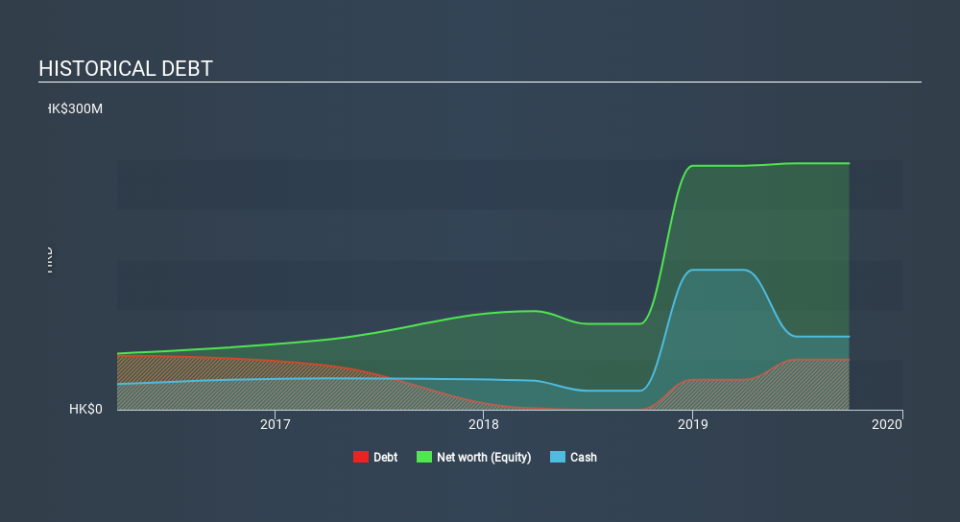Here's Why Hang Yick Holdings (HKG:1894) Can Manage Its Debt Responsibly

Warren Buffett famously said, 'Volatility is far from synonymous with risk.' So it seems the smart money knows that debt - which is usually involved in bankruptcies - is a very important factor, when you assess how risky a company is. We note that Hang Yick Holdings Company Limited (HKG:1894) does have debt on its balance sheet. But the more important question is: how much risk is that debt creating?
When Is Debt Dangerous?
Debt and other liabilities become risky for a business when it cannot easily fulfill those obligations, either with free cash flow or by raising capital at an attractive price. Ultimately, if the company can't fulfill its legal obligations to repay debt, shareholders could walk away with nothing. However, a more frequent (but still costly) occurrence is where a company must issue shares at bargain-basement prices, permanently diluting shareholders, just to shore up its balance sheet. Of course, debt can be an important tool in businesses, particularly capital heavy businesses. When we think about a company's use of debt, we first look at cash and debt together.
See our latest analysis for Hang Yick Holdings
How Much Debt Does Hang Yick Holdings Carry?
You can click the graphic below for the historical numbers, but it shows that as of September 2019 Hang Yick Holdings had HK$50.0m of debt, an increase on none, over one year. However, its balance sheet shows it holds HK$73.1m in cash, so it actually has HK$23.1m net cash.
A Look At Hang Yick Holdings's Liabilities
We can see from the most recent balance sheet that Hang Yick Holdings had liabilities of HK$67.8m falling due within a year, and liabilities of HK$1.24m due beyond that. Offsetting these obligations, it had cash of HK$73.1m as well as receivables valued at HK$147.4m due within 12 months. So it can boast HK$151.6m more liquid assets than total liabilities.
This surplus suggests that Hang Yick Holdings has a conservative balance sheet, and could probably eliminate its debt without much difficulty. Simply put, the fact that Hang Yick Holdings has more cash than debt is arguably a good indication that it can manage its debt safely.
It is just as well that Hang Yick Holdings's load is not too heavy, because its EBIT was down 60% over the last year. When it comes to paying off debt, falling earnings are no more useful than sugary sodas are for your health. The balance sheet is clearly the area to focus on when you are analysing debt. But you can't view debt in total isolation; since Hang Yick Holdings will need earnings to service that debt. So when considering debt, it's definitely worth looking at the earnings trend. Click here for an interactive snapshot.
But our final consideration is also important, because a company cannot pay debt with paper profits; it needs cold hard cash. While Hang Yick Holdings has net cash on its balance sheet, it's still worth taking a look at its ability to convert earnings before interest and tax (EBIT) to free cash flow, to help us understand how quickly it is building (or eroding) that cash balance. In the last three years, Hang Yick Holdings's free cash flow amounted to 22% of its EBIT, less than we'd expect. That's not great, when it comes to paying down debt.
Summing up
While we empathize with investors who find debt concerning, you should keep in mind that Hang Yick Holdings has net cash of HK$23.1m, as well as more liquid assets than liabilities. So we are not troubled with Hang Yick Holdings's debt use. There's no doubt that we learn most about debt from the balance sheet. However, not all investment risk resides within the balance sheet - far from it. For instance, we've identified 4 warning signs for Hang Yick Holdings (2 make us uncomfortable) you should be aware of.
When all is said and done, sometimes its easier to focus on companies that don't even need debt. Readers can access a list of growth stocks with zero net debt 100% free, right now.
If you spot an error that warrants correction, please contact the editor at editorial-team@simplywallst.com. This article by Simply Wall St is general in nature. It does not constitute a recommendation to buy or sell any stock, and does not take account of your objectives, or your financial situation. Simply Wall St has no position in the stocks mentioned.
We aim to bring you long-term focused research analysis driven by fundamental data. Note that our analysis may not factor in the latest price-sensitive company announcements or qualitative material. Thank you for reading.

 Yahoo News
Yahoo News 

